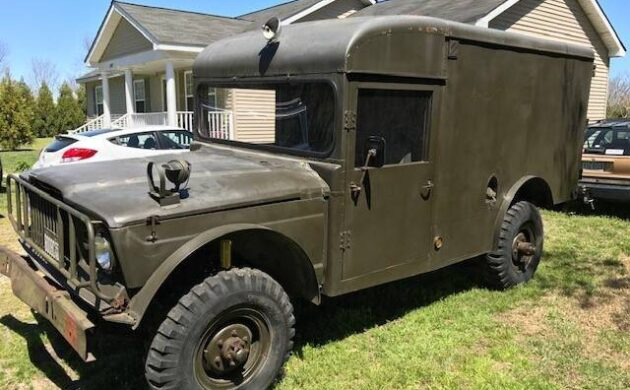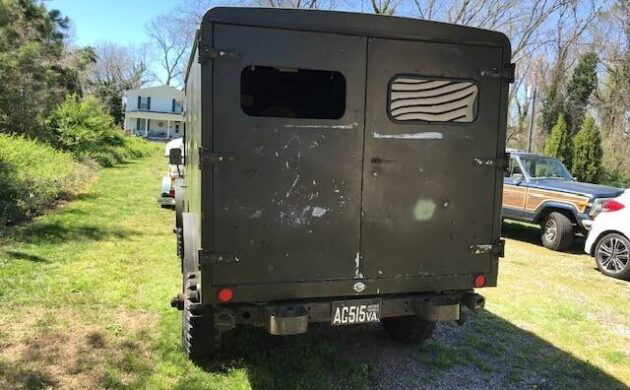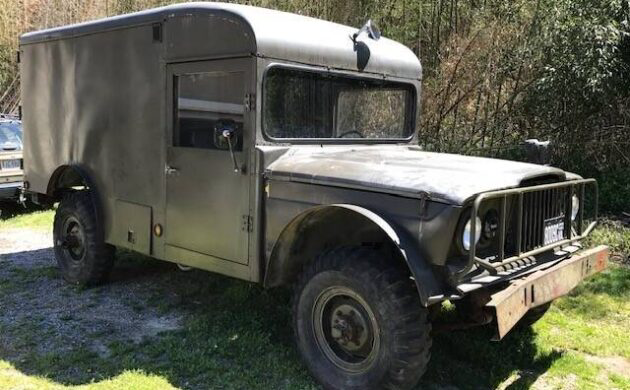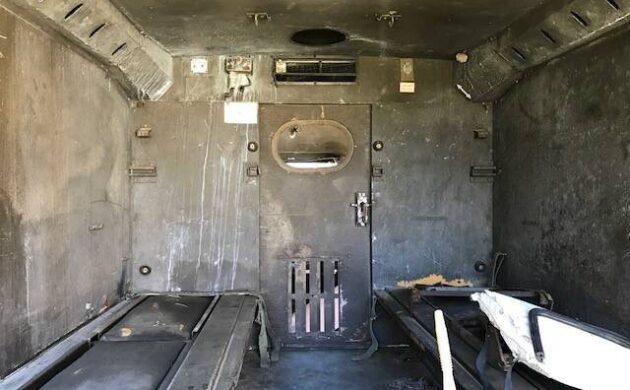Getting Away From It All: 1968 Kaiser M725 Ambulance
With everything that is going on in today’s crazy world, the urge to get away from it all is rising in every one of us. There is nothing more soul cleansing than camping far away from everyone else right next to your four wheel drive gas guzzling military vehicle. If you have ever thought about taking a serious trip far off the grid, then this is the vehicle for you. Focus your dreams around this 1968 Kaiser M725 ambulance for sale on craigslist just outside of Norfolk, Virginia. This rugged project truck has a running engine and can be your ride to the boondocks for a paltry $3,000. That leaves plenty of money for the extras needed to make your campsite home. Thanks to Chuck F. for the tip!
My wife and I are what you might call seasoned campers. Early in our relationship we started with a tent and a couple of cots and quickly pushed the limits of luxury in tent camping. It got to the point that our weekend load out would completely fill up a Ford Explorer and a large metal carrier that slid into the receiver. After a long race weekend at Talladega that included a tornado on the property (unbeknownst to us at the time), torrential rain, hordes of inebriated rednecks, and a complete permeation of our skin and clothes of campfire smoke to a level that really impressed the patrons at a nearby Olive Garden during their evening meal, the end of tent camping was in sight. Oh, Ialmost forgot that it took months for the smoke smell to finally escape from the Explorer’s interior. Don’t think I didn’t get a daily update on that situation.
After that trip the wife put her foot down and demanded that we purchase a travel trailer. Her reasoning was that it would be safer than a tent in a tornado, and I couldn’t convince her otherwise. She also wanted to have a toilet, shower, air conditioning, and all those other modern luxuries that she would no longer have to leave at home. I didn’t want to spend the money but must admit that it was a good purchase. Having cheap lodging for weekend getaways was very nice. It worked out to be very cheap after you completely outfitted it with everything you need in a regular house, paid the fuel bill for the tow vehicle that miraculously got half its regular fuel mileage and forked out for the many trips out to eat even though we had all the gear needed to cook a Thanksgiving meal at the Ritz-Carlton. Don’t forget five years of payments. One more thing that potential campers should know that any trip to Wal Mart for a little thing invariably results in your leaving with a buggy full of unnecessary items and a receipt totaling over $100 (inflation adjustment would now be a half-filled buggy and a $200 receipt).
That camper is still with us and has held up well. I’ll admit I treasure all of the memories that we had on our trips. The problem is that our lives have changed, and weekend camping just isn’t as practical as it used to be. We also now live in an area where a large, tall camper is rather limiting. The good news is that there are a lot more opportunities to camp far off main roads in state and federal lands. We have explored some of these without the camper, but a rugged, purpose-built four-wheel drive outfitted for days off the grid in the back country would be absolutely perfect.
So, when I saw this 1968 Kaiser M725 ambulance on the tips page the little light bulb in my brain started to give off that pale amber glow. This former Vietnam era ambulance would be the perfect back country camping vehicle. These beasts were made for the most rugged of use, have a large cargo area that is protected from the elements, and the olive drab look would not look out of place in a towering forest. Combined with some of the great camping products that are available now such as solar panels, seven-day coolers, fuel sipping portable stoves, and modern-day electronics to get you there and back, this could be the greatest escape vehicle ever cobbled together. It would also make a great base camp for hunting.
The price is definitely right, even though this olive drab ambulance is not currently running. The body is in great shape, and your local NAPA likely has all of the parts you would need to get it back on the road. Any other parts could be sourced from one of the many businesses that specialize in military surplus vehicles. It wouldn’t be fast on the highway, but that is not the point.
Getting away from it all and being away from the cell phone and internet chains that bind us would be a good thing for all of us. Perhaps we would all be a little friendlier if we spent some time in nature.
Do you think this would be a great backwoods camper? Do you have a love for camping? Tell us your experiences and thoughts in the comments.
Auctions Ending Soon
 2006 Ford Mustang Saleen S281 SCBid Now10 hours$15,000
2006 Ford Mustang Saleen S281 SCBid Now10 hours$15,000
 2002 Subaru Impreza WRXBid Now3 days$333
2002 Subaru Impreza WRXBid Now3 days$333
 1975 Chevrolet Corvette ConvertibleBid Now3 days$3,000
1975 Chevrolet Corvette ConvertibleBid Now3 days$3,000
 1964 Ford F-100 Camper CustomBid Now3 days$2,000
1964 Ford F-100 Camper CustomBid Now3 days$2,000
 2006 Jeep Wrangler SportBid Now5 days$10,500
2006 Jeep Wrangler SportBid Now5 days$10,500





Comments
2 thoughts here, camping ( if that’s what they call it) and the vehicle itself.
1st, camping means many things to different people today. While it’s true, camping initially was to get away from the modern world, (modern in the 60s? Oh yeah) today, the modern world comes with them. I have a neighbor, LOVES his camper, BUT, a phone signal is not only imperative, if there is no signal, they move on to a place that has one. Everything from barometric pressure to the price of tea in China, simply can’t be left behind. A far cry from when I camped as a kid, we had to plead to bring our bikes so we had something to do. Today, camping involves these ultimate slideout behemoths, a 4 door pickup and 2 ATVs, MAYBE a fishing boat instead of the ATVs, but point is, I just don’t see many small campers, JUST going camping. With the cheapest Airstream ( not much more than a teardrop) upwards of $FORTY GRAND!!!, it has all but eliminated the folks and families that could really enjoy it. Que sera, sera,,all about money
Now, the truck is neat, Kaiser was military quality, so no problem there. They dropped these out of airplanes. With RV components reaching the stratosphere, a conversion seems highly unlikely, and more like for a building contractor to get back to the distant multi million dollar mansion located where a rabbit wouldn’t go, but as a pleasure vehicle, there’s much better. This truck weighs almost 5500 pounds, and powered by the Tornado OHC-in-line 6, one of the absolute BEST motors made, but just try another, most were military and destroyed. They rarely made them for the private sector and parts probably aren’t at the local AutoPLace. I say, forget the camper, and just use it as is. It will go 55mph, if you dare, and the last 4×4 you’ll ever need. Great find.
I love it ! These so called campers are houses on wheels some of them are bigger than my first house. Camping is in a tent if it doesn’t fit on my bike I don’t need it. I think camping out of a truck with a cap on it is also camping if you are living out of it for longer periods of time getting away is to get back to basics what do I need to survive. This truck is prefect just needs two mattress for the two cots pots pans food and clothing can all be stored in milk crates under the cots.
The Tornado OHC six was the only engine used in the J-Series Jeeps (later SJ, covering the Wagoneer and J pickups, 1962-65). It was essentially a sound design, but too rushed – an OHC conversion of a proven Continental-designed flathead six. Problems and complaints from owners, led Kaiser to start using AMC sixes, later the AMC 327 and Buick 350 V8.
When Kaiser got the military contract for the Buck-And-A-Quarter trucks, based on the J-Series, they chose to use the Tornado six. Perhaps to liquidate a stockpile; perhaps to amortize sunk costs in development.
No matter; the six, not doing well in civilian hands, did that much poorer with the Army and Marines. In three years, the decision was made to replace those trucks with Dodges – and Kaiser Jeep was gone as well.
In fairness, the engine did enjoy a long second life, as the powerplant for the IKA Torino in Argentina. All it really needed was development, something that Kaiser, at home, couldn’t give, but IKA (also owned partly by Kaiser Industries) could and did do.
Posting has already been deleted. I suspect someone showed up with $3000 cash in hand. I would be interested in hearing more reader feedback on the Tornado OHC 6. I always heard good things about it. I would agree that this vehicle is rather hefty for that engine, but if speed is not the issue then you don’t need much more.
I see this and think of the TV show Mash
War-era vehicles. You would see them in newsreels and TV coverage of Vietnam and see they had what appeared to be Wagoneer hoods.
Father of a friend of mine bought one of the first Wagoneers. I don’t recall the details as I was about 12 in ‘64 or so when that engine started giving trouble. They traded it on a new Jeep CJ with some other engine.
I wouldn’t want to camp in this. So uneconomical. It should go to a military museum.
Small campers are out there. We use an A-Liner behind a mid-size wagon. It’s fine, and doesn’t break the bank on fuel.
For the amount of work needed to concert this into a camper plus the expense, Save a bundle and buy a camper.
Where’s Ironsides?
I was serving when the M38B1 Dodge power wagon finally went into the sunset. All it needed was a better water pump and power steering. But alas, some contract officer bought this fiasco. They were constantly broke down. Drive shafts would explode and you couldn’t keep oil in the transmission it leaked so bad. Too bad they made the same mistake when they replaced these with the Dodge P/U/chassis for all the same 5/4 uses. We couldn’t buy enough ballast resisters to keep them running either. Bottom line, a commercial vehicle is not adaptable to military use. I was one of the original Project Officers developing the Hummer, at least we got that one right!
Craigslist ad has been deleted already.
I started as a US Army mechanic in the early 70s, and by the time I left the Military I was an acting sergeant running a motor pool.
For the Army, these motors were junk. I ran a large motor pool facility that maintained about 3,000 wheeled vehicles in Germany, these were kept ready should WW3 erupt in Europe. In our facility, the vast majority of these Tornado OHC engines were “Red-lined” for major OHC oil loss issues. Plus, the OHC cam covers, having been made of die-cast aluminum, when the covers were tightened down, they would bend outward and leak oil, as the bolts holding them down were not along the base of the valve cover, but on the centerline at the top. Tightened down too much, they would often develop cracks because the casting was too thin to take the pressure.
As for the ease of getting parts at the local NAPA or other parts jobbers, the vast majority of mechanical parts were not the same as on civilian versions.
Thanks for your expert opinions, Bill, and thanks for the service. Most of us had no experience whatsoever with those motors. While it wasn’t the 1st OHC motor, for Americans, it was unusual. It’s simplicity seemed to be its up side, the cam actuating both intake and exhaust, if the military bought it, it should be right, no? Not always, and btw, I hope those 3,000 vehicles are still on “stand-by” today,,,
Howard,
I went back to the base outside of Mannheim in 1997, and all the vehicles are long gone with the end of the cold war [present situation excepted!]. The unit was one of 2, mine was the 1st Combat Equipment Group East [CEGE], and the other was the 1st Combat Equipment Group West [CEGW]. We were tasked with maintaining all the equipment the US army would need if they sent 2 divisions of soldiers should war erupt. We maintained everything needed, from TP rolls to tracked tank recovery vehicles.
The Jeeps, 5/4 trucks, 2.5 ton trucks, 5 ton trucks, and a few V12 International tank transporters all sat in temperature and humidity controlled buildings, each many acres in size. We had to service EVERY vehicle once a year, change oils and lube chassis, plus take care of any other special service needs for specific trucks. Then we would pull the batteries back out and put the trucks back to sleep for another year!
My motor pool handled the 2.5 and 5 ton trucks, and there was another motor pool staffed with Polish civilian workers who handled the jeeps and 5/4 trucks. That said, we often had to work on the smaller trucks when the Poles ran behind on the monthly service requirements. So I know these 5/4 trucks liabilities far too well!
And in addition to all this work, once a year the army sent over the extra troops for what was known as “Reforger”, AKA “REturn FORces to GERmany”, and in the space of a few days we HAD to equip all the troops with EVERYTHING. That’s also called “working 24 hour shifts for a week with no sleep”.
When I came back in ’96, and the guard at the front gate heard that I had been there 20+ years before, he arranged an escort for me to the main office, and I met with the Officer in charge. In the main hallway were large color group photos of every soldier, by year. He located 1975 and found my name. He said that in the 5 years he was there, NO ONE had ever come back! He insisted my friend and I join him and the #2 officer for lunch!
Bill, thanks for the detailed explanation. Sounds like it would be fine if delicately attended to. But not the right motor for military applications. I appreciate you feedback. I wish more people would share their real knowledge. There is always “more to the story”.
JMB#7,
You describe the situation well. In private use, those making the repairs have a vested interest in doing the job to their best ability. Car owners who do their own repairs based on the repair manual will be careful, as well as shop mechanics who, if the job is done wrong, have to fix it at no additional charge.
Military mechanics [as I know from personal experience of running a motor pool] will be far more likely to short-cut repairs, first because it’s not their personal vehicle, and if it breaks during the repair, they just go ahead and repair it, no real personal consequences involved.
Case in point is the valve cover on the OHC 5/4 ton truck. The Army had far too many of these with deformed or cracked valve covers from being over-tightened, so many that the wait for the new parts was usually 4 to 6 months! When I’ve spoken with people who have the civilian versions [note – I’ve never worked on the civilian version], I’ve heard those have a stamped metal valve cover with steel internal reinforcements, not the military die-cast aluminum variant.
may B like the white jeep – go do some food truckin at one of those Off Road Parks or a ‘jamboree’. (You do the welding, wife could feed em).